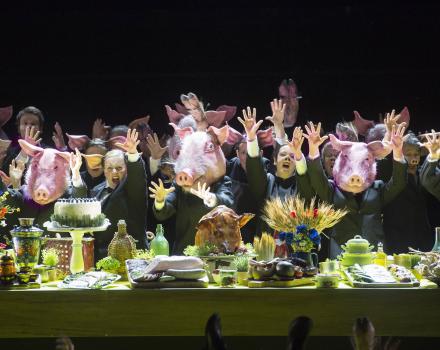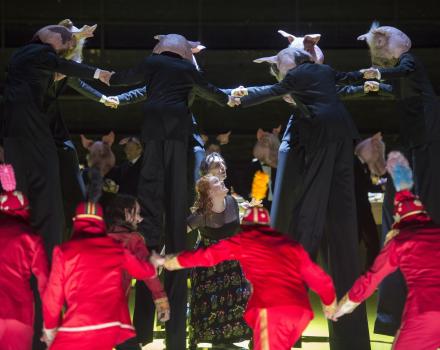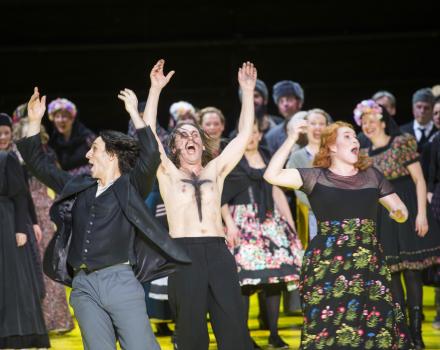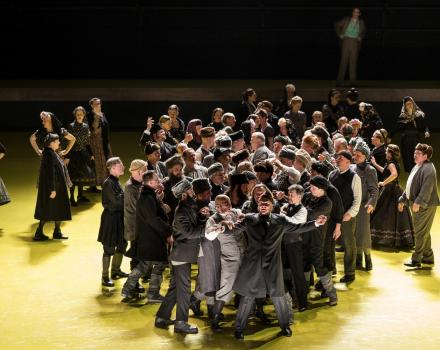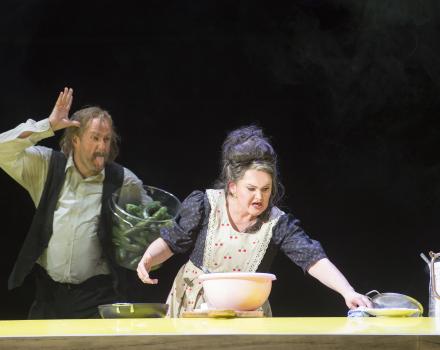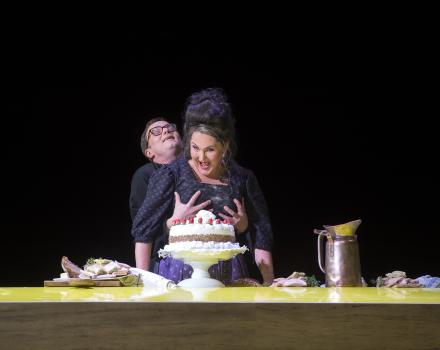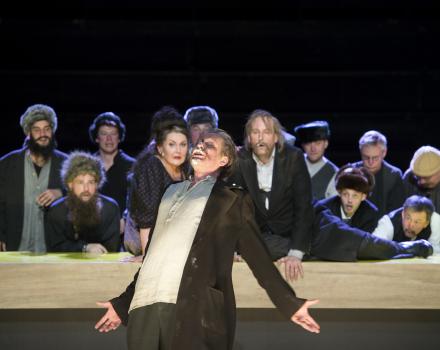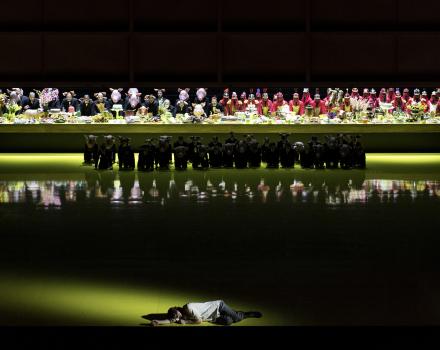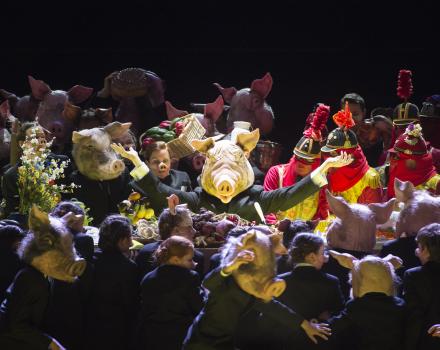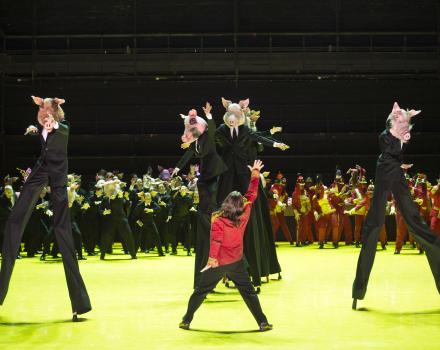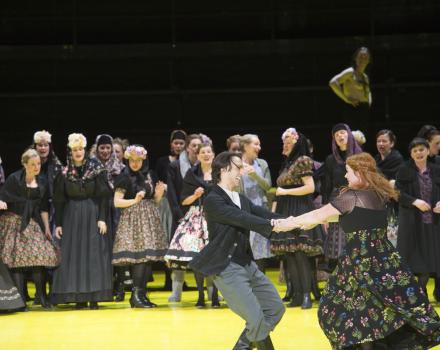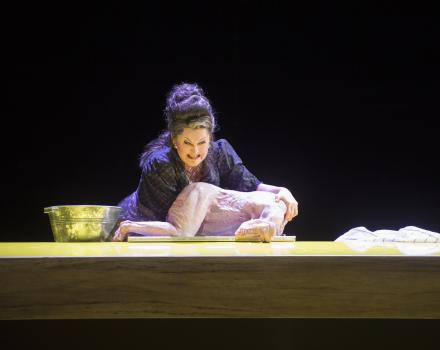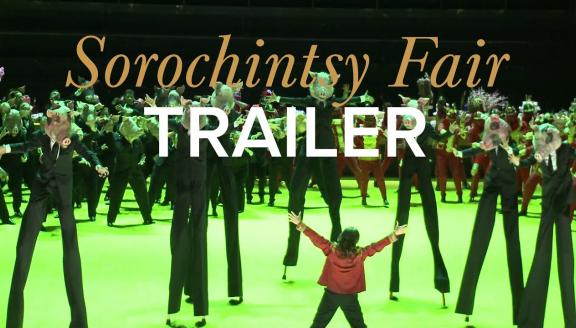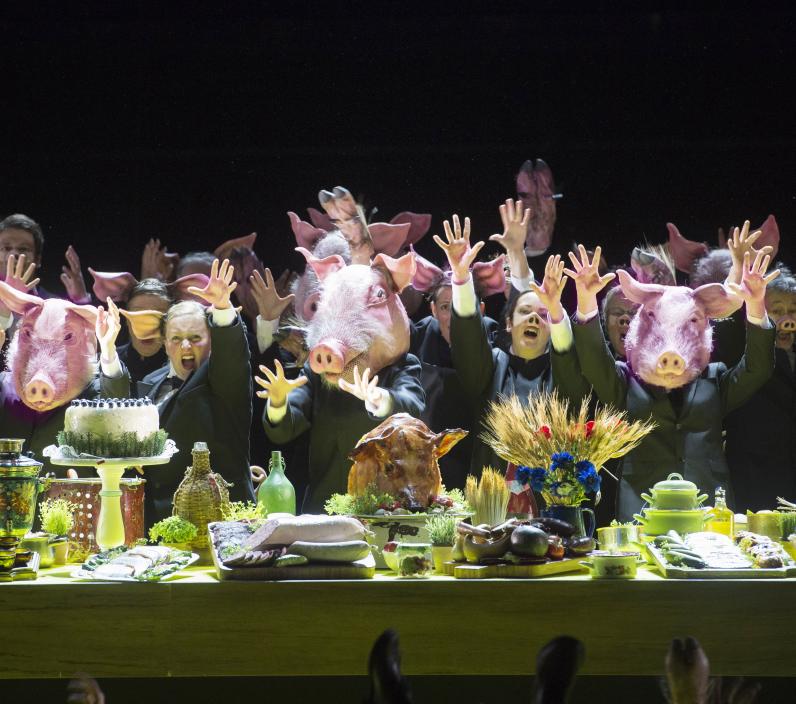

Sorochintsy Fair

A devil is at work in the Ukrainian village of Sorochintsy, terrifying residents and travellers alike. Among them a farmer whose daughter is not allowed to marry her lover because her quarrelsome stepmother is against it.
Drinking songs, dances, folklore and a wild witches' Sabbath - Barrie Kosky stages Mussorgsky's comic-grotesque opera as a colourful, plump folk play. Left unfinished, it was reconstructed by Pavel Lamm and instrumentalised by Vissarion Shebalin in 1932, respecting the work’s uncouth style.
Cast
Cherevik, a peasant | Jens Larsen |
|---|---|
Khivrya, his wife | Agnes Zwierko |
Parasya, Cherevik's daughter | Mirka Wagner |
Gritsko, a peasant lad | Alexander Lewis |
Afanasiy Ivanovich | Ivan Turšić |
Old crony | Tom Erik Lie |
The gypsy | Hans Gröning |
Chernobog, the black god | Carsten Sabrowski |
Chorus | Chor der Komischen Oper Berlin, Vocalconsort Berlin |
Orchestra | Orchester der Komischen Oper Berlin |
| ... | |
Music | Modest Mussorgsky |
|---|---|
Conductor | Henrik Nánási |
Director | Barrie Kosky |
Sets | Katrin Lea Tag |
Lighting | Diego Leetz |
Costumes | Katrin Lea Tag |
Text | Modest Mussorgsky |
Chorus Master | David Cavelius |
| ... | |
Video
The story
A devil is making mischief in the small Ukrainian village of Sorochintsy. Cast out of hell, he turned to drink out of boredom, so the legend goes, and pawned his red overcoat to the manager of the local pub, intending to redeem it one year later. But the publican sold the coat ahead of time. The devil took revenge by haunting him at night in the form of a pig. Today the devil is still searching for his red overcoat in Sorochintsy, striking terror into the villagers’ hearts.
Among them is the farmer Cherevik, whose daughter Parasya has fallen in love with the country lad Gritsko, but can’t marry him because her combative stepmother Khivrya, who constantly bullies her husband Cherevik around, is against it. A gypsy promises to help the two lovers on condition that Gritsko sells him his oxen cheap. Khivrya throws the perpetually drunk Cherevik out of the kitchen because she is expecting her lover Afanassy Ivanovich, the young son of the village priest. She deploys all her culinary arts in order to seduce him. But before she can enjoy the fruits of her labours, Cherevik returns accompanied by his comrade and other drinking pals. In frantic haste, Khivrya finds a place for her lover to hide. The assembled drinkers press the comrade to tell them the story of the devil and his red overcoat. All are seized by fear. Suddenly Afanassy Ivanovich emerges from his hiding place and everyone scatters in panic.
Gritsko has a diabolical dream of a witches’ sabbath in which satanic priests in pig form worship the arch-fiend, and he finds the devil’s red overcoat. Next morning Parasya is despondent over her dashed hopes but cheers herself up by singing. Gritsko appears and the two lovers embrace. Cherevik has decided to go ahead with the wedding against his wife’s will. Khivrya returns, fuming with rage, but the gypsy and bystanders only laugh at her. The villagers all dance a hopak together.
Insights
A little piece of village life...
Interview with director Barrie Kosky
What distinguishes Mussorgsky from all the other Russian composers?
BARRIE KOSKY Although he comes from the Russian tradition, the radical musical exploration of his themes makes him a complete outsider. I think the composers of his time, the Borodins and Glazunovs and Rimsky-Korsakovs, sensed that he was a very special composer. But they could not admit it to themselves. They thought that Mussorgsky simply couldn't orchestrate properly. So his friends set about ‘helping him’. But in reality, Mussorgsky was a genius and knew exactly what he was doing. But apparently, only later generations could realize that. Mussorgsky's oeuvre had a great influence on composers like Stravinsky or Shostakovich. Unfortunately, it is very small, and on top of that, he left much of it unfinished. He was a complicated, manic-depressive alcoholic, his music is full of an incredibly misanthropic desolation.
But Sorochintsy Fair is not necessarily desolate ...
BARRIE KOSKY Yes and No. After Boris Godunov and parallel to Khovanshchina, Mussorgsky deliberately wanted to write a comic opera as a way out of this desolation. Something along the lines of ‘I'm going to write myself into a good mood!’ Maybe it was also a bit about childhood memories. Mussorgsky was born and raised in the country. Perhaps composing Sorochintsy Fair was also an attempt to remember his happier childhood, away from the city of Petersburg. But still, there is an incredibly dark side to the Fair. That comes from Gogol and his strange mixture of comedy and misanthropy. A few years earlier, Mussorgsky had tried his hand at Gogol's The Marriage, but this is a very different Gogol. The Gogol of Evenings on a farm near Dikanka - Sorochintsy Fair is the first of eight stories published under this title - is the Gogol of superstition, folklore, strange and grotesque. A perfect mixture!
Is this desolation problematic for you as a director?
BARRIE KOSKY No, on the contrary! There is something incredibly fascinating about it because it is a very special way of transgression. It's as if the battle was lost long ago, as if the inner demons had won. Mussorgsky’s music seems to be located somewhere between reality and non-reality. And he feels comfortable in this interstice. Not ‘comfortable’ in the sense of happy, but the battle is behind him. It is as if the apocalypse had already taken place, and we are looking at a dead landscape after the catastrophe. That's why the music often seems to me like a procession, a procession of dead souls.
What is Sorochintsy Fair about?
BARRIE KOSKY A village is terrorised by the superstition of a devil who once gave his red coat to a Jew to pay this tab in the pub. And now the devil haunts the village at the same time every year to claim his coat. That very night we meet a family that is very unhappy with their life. - That's all! It is a small piece of folklife in Ukraine. I like the simplicity of the story. It is the opposite of what we usually experience on stage. The plot is simple and straightforward, almost nothing happens. But as so often in Slavic works, the whole life is contained in it: religion, superstition, love, sex, family, food, drink, ignorance and mass hysteria... The microcosm of the village as a mirror of the whole human life!
How to deal with such an unfinished work as Sorochintsy Fair?
BARRIE KOSKY Actually, only another half-hour of music would have been needed for the two-hour opera would have been complete. But the absence of certain parts is, in my opinion, not as serious as in other works, because unlike in Boris Godunov or Khovanshchina, here Mussorgsky did not set a psychologically complex plot to music. It is a puppet theatre. Small glimpses of life, like in a photo album: here are the lovers. And here are the father and the stepmother. And there! The lovers again. Here we see the frustrated wife with her young lover. Oh, she almost gets caught. Now, where did that pig in the background come from? ... short, little snapshots, like leafing through a strange photo album. But it certainly wouldn't have hurt if Mussorgsky had composed the missing 30 minutes. The fragmentary is not part of the work itself. Starting with Vissarion Shebalin’s completion, we tried to make the evening as round and interesting as possible, and therefore added additional music: three songs arranged for choir and one song sung by Grizko.
The story then ends succinctly: after the nightmare, everyone comes together again. The lovers are allowed to marry, the mother storms off, the villagers laugh at her, everyone sings a song and the opera is over. ‘Once upon a time, there was a small village at the end of the street…’ As I said before, it is nothing but a small piece of village life that is shown here. No more, but also no less.
Gallery
